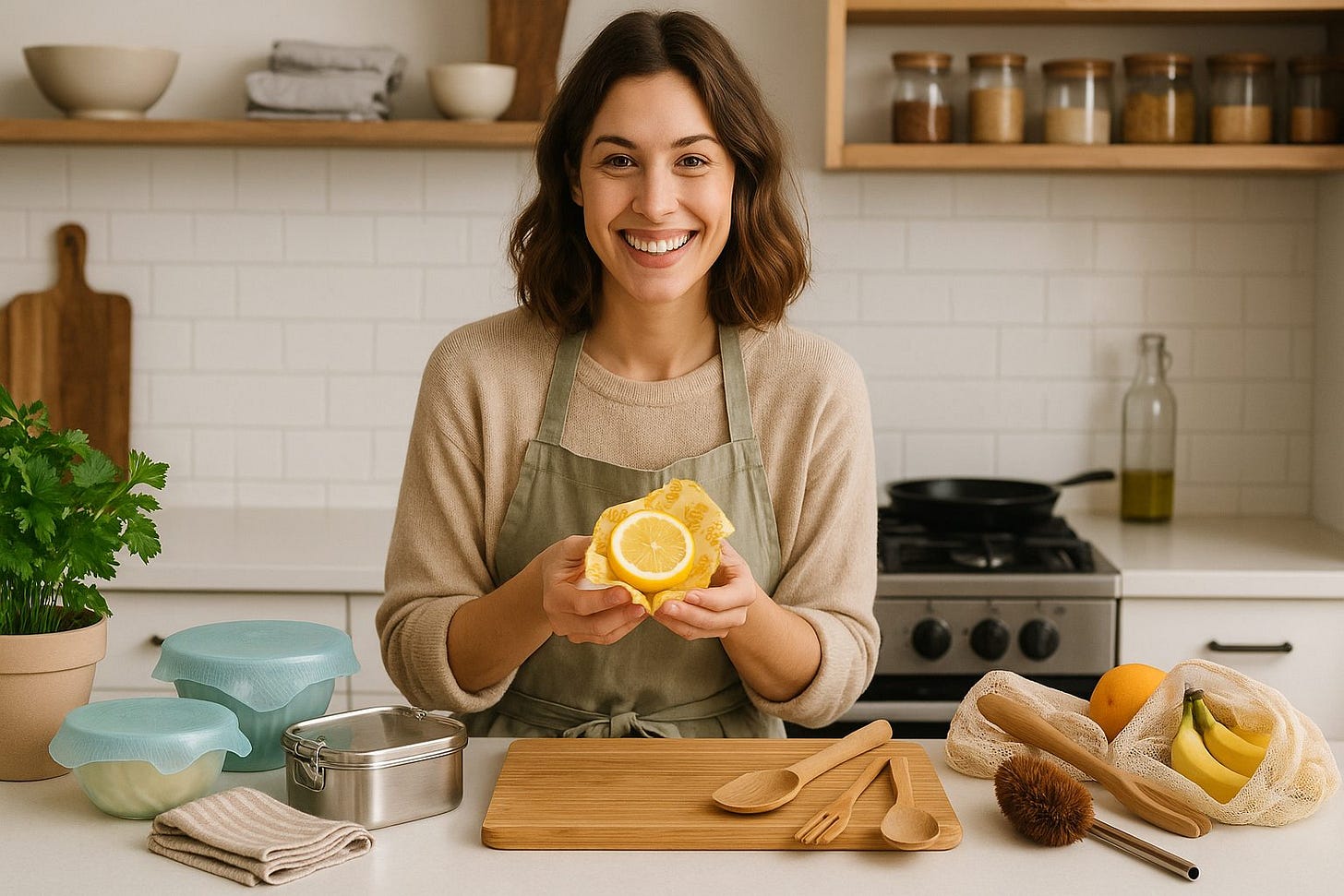6 Eco-Friendly Kitchen Swaps That Actually Work (and Don't Suck)
Green your kitchen with swaps so good, they’ll make Mother Earth high‑five you (and actually taste great too).
Ever stand in your kitchen and think, "This place reeks of plastic and regret"? Let's fix that. I'm taking you on a culinary crusade—swapping out the throwaway for the timeless. We're not just saving the planet; we're upgrading your kitchen game. Think durable, non‑toxic, and effortlessly stylish. Ready to swap smarter—not harder? 🚀
1. Plastic Wrap → Beeswax or Silicone Covers
Plastic wrap is that clingy ex you can't quite ditch. But moves now: beeswax wraps—the OG sustainable cover—are adorable, breathable, and compostable. Silicone stretch lids are the grown-up version—flexible, dishwasher-safe, and perfect for mismatched bowls.
I think beeswax wraps are pure magic—wrap half an onion, roll it up, and it stays fresh. Might they not last forever? Sure. But reuse, re-wax, repeat. Always sounds better than landfill-bound cling film, doesn't it?
Sources: swaps well‑known and recent.
2. Paper Towels → Reusable Cloths (Swedish or Cotton)
Those paper towels that vanish after one spill? Trashable convenience—literally. Swedish dishcloths soak up messes, machine-wash easily, and even come in fun prints. Over time, one cloth replaces about 15 rolls of paper towels—big savings, small footprint.
Cloth napkins? Yes, even better. Soft, chic, and here for the long haul. Yup, you'll feel a tiny sense of pride replacing disposable with durable—call it eco-chic smugness. 🙂
3. Plastic Containers → Glass or Stainless Steel Storage
Tupperware: questionably clingy, stains easily, and may leach plastic. Glass containers? Sharp visuals, microwave-safe, odor-resistant. Bonus: they double as serveware. On the other hand, stainless steel lunchboxes are the sleek, leak-proof minimalists your countertop deserves.
The Science: chefs and health pros point to microplastic-free zones in glass/stainless storage. Trust me, your kale salad stays legit.
4. Non‑stick Teflon Pans → Cast Iron or Stainless/Carbon Steel
Non-stick pans are convenient…until they chip toxic flakes. Cast iron or high-quality stainless steel pans? That's kitchen royalty. They last decades, distribute heat beautifully, and add iron to your meals.
Carbon steel also fits—lighter than cast iron, but tough. Your eggs may stick the first few uses. But become seasoned, and you get a non-stick surface you crafted yourself. That's reward right there.
Swapping pans = big win for health + flavor.
5. Plastic Utensils & Scrubbers → Bamboo, Wooden, or Silicone Tools
Plastic spatulas, cutting boards, scrubbers—they shed microplastics and chemicals. Let's cut those out. Swap to bamboo cutting boards: naturally antimicrobial, knife-friendly, and stylish. Utensils in stainless or silicone (heat-resistant) just feel better, too.
Scrubbers? Natural coconut fiber or tampico brushes are compost-friendly and surprisingly durable. Go ahead—scrub with satisfaction.
Cutting‑board science and scrubber swap validated by experts.
Related: 5 Swaps That'll Cut Your Plastic Use in Half (Without Going Zero-Waste)
6. Single‑Use Bags & Straws → Reusables (Mesh, Silicone, Metal)
Plastic produce bags and disposable straws get used for minutes and pollute for centuries. Fix that. Grab washable mesh or cotton produce bags—pop 'em open at checkout, toss veggies inside.
Straws? Silicone for kids and smoothies, stainless or bamboo for beverages on the go. Even compostable wheat straws for parties—for when fuss-free trash is still eco.
Reddit users swear by Swedish cloths; travelers dig culinary gardens.
Why It Actually Works
Healthier: Kicking toxins like microplastics and PFAS. Chefs and scientists agree.
Cost‑Effective: Rinse, reuse, and eventually refuse single‑use buys. Swedish cloths = 15 rolls.
Durability & Style: These aren't compromise—they're upgrades. Glass, bamboo, steel: resilient and beautiful.
Impact: Less plastic, less landfill. Doable. Real. Change.
Also read: 7 Things in Your Kitchen That Are Wrecking the Environment (and What to Use Instead)
Call To Action
👉 Start with one swap this grocery run.
👉 Share your kitchen selfie with your new beeswax wrap, post‑swap apron on Instagram, and tag a friend.
👉 Choose one more swap each month—it's zero‑stress sustainability.
Final Dish
Green living in the kitchen isn't about perfection—it's about progress. These six swaps may look small individually, but together they flip your kitchen from plastic pitfall to sustainable sanctuary.
You don't need to go off-grid. Just make choices informed by expertise, feel good about them, and let your kitchen tell a better story—one swap at a time.
Ready to level up your kitchen? What's swap #1 going to be? 🌱


